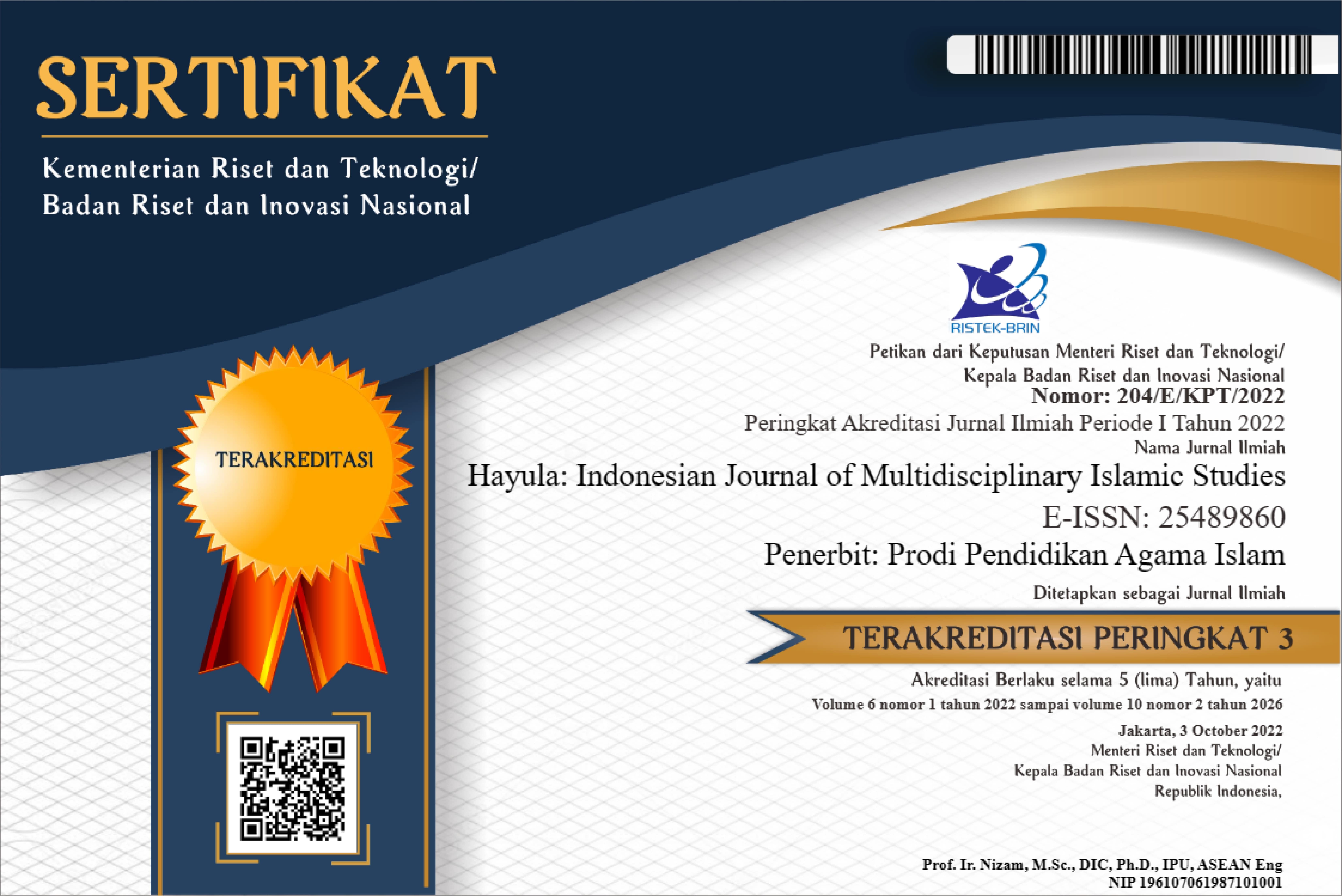Pengaruh Pembiayaan Perbankan Syariah terhadap Pertumbuhan Ekonomi: Studi Empiris di 13 Negara
DOI:
https://doi.org/10.21009/hayula.002.1.05Keywords:
economic growth, Islamic banking, financing.Abstract
This study aims to analyze the effect of financing in Islamic banking on economic growth. As case studies, 13 countries are selected which covers period from 2010 to 2015 by employing the Panel GMM. The results of this study indicate that financial depth in Islamic banking has a positive influence on economic growth. In addition, this research shows that trade oppennes has a positvely contribution towards economic growth, and reversely inflation has negative impact. This research recomends policymakers to support Islamic banking industry in order to create sustainable economic development.
References
Abdul, Walid Abdalla. “The Role of Islamic Banking on Economic Growth in Kenya,†2013.
Agnello, Luca, and Ricardo M. Sousa. How Do Banking Crises Impact on Income Inequality, 2011.
Akimov, Alexandr, Albert Wijeweera, and Brian Dollery. “Finance-Growth Nexus : Evidence from Transition Economies B†(2006).
AL-Oqool, Mohammed Ali, Reem Okab, and Mohammed Bashayreh. “Financial Islamic Banking Development and Economic Growth: A Case Study of Jordan.†International Journal of Economics and Finance 6, no. 3 (2014): 72–79.
Ali, Md Hakim, and Md Akther Uddin. Does Islamic Bank Financing Lead to Economic Growth: An Empirical Analysis for Malaysia, 2016.
Ayyagari, Meghana, Thorsten Beck, and Mohammad Hoseini. Discussion Paper Series, 2013.
Caporale, Guglielmo Maria, and Mohamad Husam Helmi. Islamic Banking, Credit and Economic Growth, 2016.
Chong, Beng Soon, and Ming Hua Liu. “Islamic Banking: Interest-Free or Interest-Based?†Pacific Basin Finance Journal 17, no. 1 (2009): 125–144.
Dadzie, Christabel, Luisa Blanco, and Coline Dony. Study on Crime and Investment in Latin America and the Caribbean, 2014.
Daly, Saida, and Mohamed Frikha. “Banks and Economic Growth in Developing Countries: What about Islamic Banks?†Cogent Economics & Finance 3, no. 1 (2016): 1–26.
El-Galfy, Ahmed, and Khiyar Abdalla Khiyar. “Islamic Banking and Economic Growth: A Review.†The Journal of Applied Business Research 28, no. 5 (2012): 943–956.
Elhachemi, Hacine Gherbi, and Mohammad Azmi Othman. “Empirical Analysis on the Nexus Between Islamic Banking Development in Terms of Size and Activity , Economic Growth and Financial Crisis in Islamic Republic of Iran†2, no. 6 (2015): 27–44.
Fajnzylber, Pablo. “Inequality and Violent of Crime.†Journal of Law and Economics XLV, no. April (2002).
Farahani, Yasdan Gudarzi and Dastan, Masood. “Analysis of Islamic Banks’ Financing and Economic Growth: A Panel Cointegration Approach.†International Journal of Islamic and Middle Eastern Finance and Management 6, no. 2 (2013): 156–172.
Fetahi-Vehapi, Merale, Luljeta Sadiku, and Mihail Petkovski. “Empirical Analysis of the Effects of Trade Openness on Economic Growth: An Evidence for South East European Countries.†Procedia Economics and Finance 19, no. 15 (2015): 17–26.
Furqani, Hafas, and Ratna Mulyany. “Islamic Banking and Economic Growth: Empirical Evidence from Malaysia.†Journal of Economic Cooperation and Development 30, no. 2 (2009): 59–74.
Goaied, Mohamed, and Seifallah Sassi. “Financial Developement, Islami Banking and Economic Growth : Evidence from MENA Region.†International Journal of Business and Management Science 2, no. 4 (2011): 1–23.
Le Goff, Maëlan, and Raju Jan Singh. “Does Trade Reduce Poverty? A View from Africa.†Journal of African Trade 1, no. 1 (2014): 5–14.
Hachicha, Nejib and Amar, Ben Amine. “Does Islamic Bank Financing Contribute to Economic Growth? The Malaysian Case.†International Journal of Islamic and Middle Eastern Finance and Management 8, no. 3 (2015): 349–368.
Imam, Patrick, and Kangni Kpodar. Is Islamic Banking Good for Growth? Finance and Development. April 2015, 2015.
Kammer, Alfred, Mohamed Norat, Marco Piñón, Ananthakrishnan Prasad, and Christopher Towe. “Islamic Finance : Opportunities , Challenges , and Policy Options.†Islamic finance (2015): 1–38.
Kenourgios, Dimitris, and Aristeidis Samitas. “Financial Development and Economic Growth in a Transition Economy : Evidence for Poland†3, no. 1 (2007).
Levine, Ross. “More on Finance and Growth: More Finance, More Growth?†Federal Reserve Bank of St. Louis Review 85, no. 4 (2003): 31–46.
Levitt, Steven D. “The Changing Relationship between Income and Crime Victimization†0 (1999): 87–98.
Mohieldin, Mahmoud, Zamir Iqbal, Ahmed Rostom, and Xiaochen Fu. “The Role of Islamic Finance in Enhancing Financial Inclusion in Organization of Islamic Cooperation (OIC) Countries.†Islamic Economic Studies 20 (2012): 55–120.
Pshisva, Rony, and Gustavo A Suarez. Capital Crimes Kidnappings and Corporate Investment in Colombia, 2010.
Rehman, Scheherazade S., and Hossein Askari. “How Islamic Are Islamic Countries?†Global Economy Journal 10, no. 2 (2010): 1–37.
Seven, Unal, and Yener Coskun. “Does Financial Development Reduce Income Inequality and Poverty? Evidence from Emerging Countries.†Emerging Markets Review 26 (2016): 34–63.
Stolzenberg, Lisa, David Eitle, and Stewart J D Alessio. “Race , Economic Inequality , and Violent Crime†34 (2006): 303–316.
Tabash, Mosab I, and Raj S Raj S. Dhankar. “Islamic Banking and Economic Growth — A Cointegration Approach.†The Romanian Economic Journal, no. 53 (2014): 61–90.
World Bank. “Financial Inclusion Overview.†April 15th.
Zirek, Duygu, Fusun Celebi, and M. Kabir Hassan. “The Islamic Banking and Economic Growth Nexus: A Panel VAR Analysis for Organization of Islamic Cooperation (OIC) Countries.†Journal of Economic Cooperation and Development 37, no. 1 (2016): 69–100.
Downloads
Published
How to Cite
Issue
Section
License
Authors who publish with this Journal agree to the following terms:
- Author retain copyright and grant the journal right of first publication with the work simultaneously licensed under a creative commons attribution licensethat allow others to share the work within an acknowledgement of the work’s authorship and initial publication of this journal.
- Authors are able to enter into separate, additional contractual arrangementfor the non-exclusive distribution of the journal’s published version of the work (e.g. acknowledgement of its initial publication in this journal).
- Authors are permitted and encouraged to post their work online(e.g. in institutional repositories or on their websites) prior to and during the submission process, as it can lead to productive exchanges, as well as earlier and greater citation of published works.
Users/public use of this website will be licensed to CC BY







